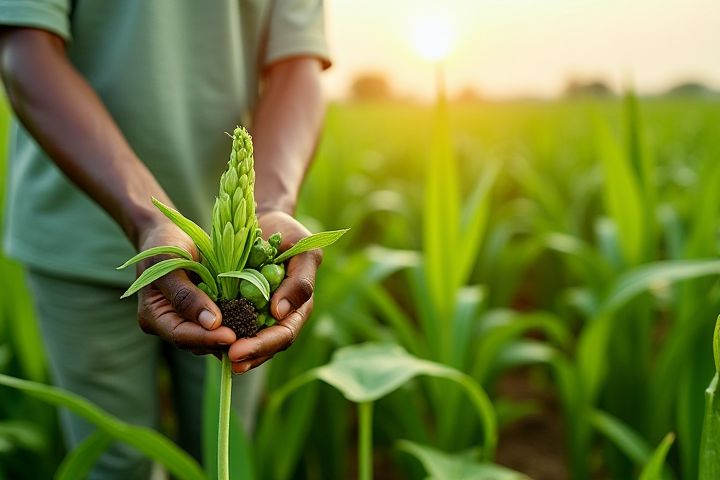
Agribusiness in Nigeria represents a significant sector, contributing approximately 26% to the country's gross domestic product (GDP). The nation's diverse climate allows for the cultivation of various crops, including cassava, yams, maize, and rice, which enhances food security and provides export opportunities. With a rapidly growing population surpassing 200 million, there is an increasing demand for sustainable agricultural practices and innovative technologies to boost productivity and reduce post-harvest losses. Investing in agribusiness not only fosters rural development but also creates job opportunities and improves livelihoods for millions of Nigerians. As a potential stakeholder, understanding the local market dynamics and leveraging government initiatives can significantly enhance your contributions to this thriving sector.
Diverse agro-ecological zones
Nigeria's agribusiness thrives due to its diverse agro-ecological zones, each offering unique opportunities for agricultural production. From the arid northern regions, conducive for millet and sorghum, to the lush, fertile lands in the south optimal for cassava and cocoa cultivation, there is a vast array of crops suited to various climates. The country's rich biodiversity enhances potential for sustainable farming practices, promoting food security and economic growth. Engaging in these diverse agricultural landscapes allows you to tap into tailored farming strategies that meet both local and international market demands.
Major contributor to GDP
Agribusiness in Nigeria serves as a major contributor to the nation's GDP, emphasizing the importance of agriculture in driving economic growth. Key sectors include crop production, livestock, and fisheries, which collectively enhance food security and create thousands of jobs. With investments in modern farming techniques and technology, Nigeria is transforming its agribusiness landscape, aiming for sustainable practices that increase productivity. By tapping into local and international markets, Nigerian agribusinesses are not only fostering economic resilience but also improving the livelihoods of millions of farming households.
Dominance of small-scale farmers
In Nigeria, agribusiness primarily relies on small-scale farmers, who play a crucial role in food production and economic sustenance. These farmers typically cultivate staple crops such as cassava, maize, and rice, significantly contributing to the country's food security and employment rates. The dominance of small-scale farming also fosters local supply chains, enhancing the distribution of agricultural products within communities. You can support this sector by investing in local initiatives that promote sustainable farming techniques and access to markets for these farmers.
Key cash crops: cocoa, palm oil
Nigeria's agribusiness sector heavily focuses on key cash crops such as cocoa and palm oil, which significantly contribute to the country's economy and export revenue. Cocoa production places Nigeria as one of the leading global suppliers, prized for its high-quality beans used in chocolate manufacturing. In contrast, palm oil is essential not only for food production but also for various industrial applications, reinforcing Nigeria's position as one of the largest palm oil producers in Africa. By investing in sustainable farming practices, you can enhance productivity and ensure the long-term viability of these lucrative commodities.
Emerging mechanization trends
Agribusiness in Nigeria is increasingly embracing emerging mechanization trends to enhance productivity and efficiency. Advanced agricultural technologies, such as precision farming and automated equipment, are being adopted to optimize resource use and increase crop yields. The integration of drones and IoT devices in monitoring crop health and soil conditions is revolutionizing traditional farming practices. By investing in mechanization, Nigerian farmers can significantly reduce labor costs and improve overall sustainability in the agriculture sector.
Government policy support
Agribusiness in Nigeria thrives under the framework of government policy support, which aims to enhance agricultural productivity and food security. Key initiatives include the Agriculture Promotion Policy (APP) and the National Agricultural Investment Plan (NAIP), designed to incentivize investment and modern farming practices. These policies provide subsidies, access to credit, and training programs, fostering an environment conducive for both smallholder farmers and large agribusinesses. As a result, stakeholders can benefit from improved infrastructure, market access, and technological advancements that collectively strengthen the agricultural sector.
Growing agritech startups
Agribusiness in Nigeria increasingly emphasizes the development of agritech startups that leverage technology to enhance agricultural productivity and efficiency. These startups offer innovative solutions such as precision farming, mobile applications for market access, and advanced data analytics, which help local farmers to optimize crop yields and reduce operational costs. By bridging the gap between traditional farming practices and modern technology, these agritech initiatives effectively contribute to food security and economic growth within the region. Investing in agritech not only supports sustainable agricultural practices but also empowers communities through job creation and improved livelihoods.
Major employment source
Agribusiness in Nigeria serves as a major employment source, supporting millions of livelihoods across various sectors including farming, processing, and distribution. The country's rich agricultural diversity offers opportunities in crop production, livestock farming, and aquaculture, contributing significantly to the national economy. Initiatives like rural agribusiness development enhance job creation, especially for youth and women, fostering innovation and sustainability in local communities. By investing in agribusiness, you can play a role in strengthening food security and boosting economic growth in Nigeria.
Significant export potential
Agribusiness in Nigeria is characterized by its significant export potential, driven by diverse agricultural products such as cocoa, cashew nuts, and palm oil. The country's expansive arable land and favorable climate conditions create opportunities for crop production that can meet both domestic and international demand. Nigerian agribusiness aligns with global trends by emphasizing sustainable practices and value chain development, thus enhancing competitiveness in the global market. With the right investment and support from government initiatives, you can tap into this lucrative sector and contribute to the country's economic growth.
Expansion of irrigation projects
The expansion of irrigation projects in Nigeria's agribusiness sector is vital for enhancing crop yields and ensuring sustainable food production. By implementing advanced irrigation techniques, such as drip and sprinkler systems, farmers can significantly reduce water wastage while increasing efficiency in water use. Improved irrigation infrastructure not only boosts agricultural productivity but also helps mitigate the impacts of climate change and erratic rainfall patterns. This strategic focus not only empowers local farmers but also strengthens Nigeria's position in the global agricultural market.
